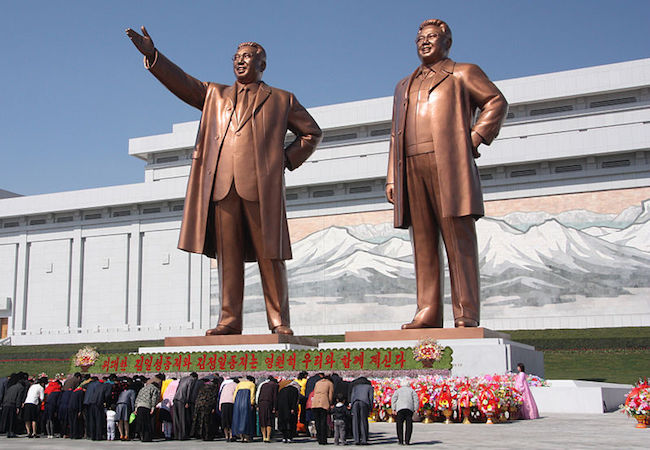
Of all the rogues there is no question that Kim Jong-Un and his odious regime in North Korea are the furthest advanced in threatening the outside world with nuclear weapons. Yet an honest administration in Washington has to ask itself how much the U.S. has been responsible for bringing about this state of affairs, one that threatened to escalate fast with North Korea announcing in October 2002 it was enriching uranium to build a nuclear weapon and now later in that year in effect abrogating the landmark 1994 agreement.
The 1994 agreement avoided war, one that President Bill Clinton was convinced could lead to a nuclear attack on South Korean cities and American troops based in the South. In the circumstances it was an amazing deal, midwifed by former President Jimmy Carter. The North agreed to close its plutonium-producing nuclear power plant and seal up the cooling rods from which weapons-grade plutonium could be extracted. In return, America with Japan and South Korea agreed to build two modern, non- plutonium-producing nuclear power stations to be in production by 2003. Also, the U.S. agreed that it would end its economic embargo and help the North with fuel oil, food and electricity.
But the deal came apart almost from the day it was signed. What happened in 2002 was the visible manifestation of a lot of less dangerous things had been going wrong for years. And all along there have been warnings enough (from this columnist for one) that if these stumbling blocks weren’t put right we’d end up where we were in 1994, with the threat of nuclear war staring us in the face. For few doubt, even those who are toughest on North Korea, that if it comes to a military conflict and North Korea feels it has everything to lose, it will use the nuclear weapons it has.
It was this threat that persuaded the Republican hardliners in Congress during the days of the Clinton Administration to go along with the main elements of the deal, even as they provoked the North with their constant attempts to minimise the commitments the U.S. had made to secure it. There were several times when the fuel oil deliveries or the food supplies were slowed. There was the successful effort in Congress to break the promise of ending sanctions, delaying action on this until 1999 when they were finally but only partially lifted. There was the blockage on talking about ways to help the North with outside electricity supplies from the South to tide it over until the new reactors were built. Not least, there was the slowdown on the promised building of the new nuclear reactors for peaceful energy.
All of these setbacks were reason enough in the North’s mind for ratcheting up the confrontations. Confrontation, they appeared to decide some time ago, is the only way to get results. Whether it is digging an enormous hole that convinced the Americans that the North was about to test nuclear triggers (wrongly as it turned out, after paying a huge sum for the U.S. to be allowed to inspect it). Or test flying a long-range rocket over Japan, which was what persuaded Congress to ease the economic embargo.
Still, the 1994 agreement limped along (and even looked as if it might be enlarged to include a restriction on missile sales) until George W. Bush came into office and made his “Axis of Evil” speech in which Iraq, Iran and North Korea were singled out. Even though the Bush administration did not move at first to discontinue the aid programme (the largest America had in Asia) or to stop work on the building of the two new reactors it did lean on South Korea to slow down its so-called “Sunshine” policy of political reconciliation. It also refused to talk about other sources of electricity supplies, prohibited its ally, South Korea, to honour a promise to send electricity to the North and refused all talk and consideration of a refurbishment of the North’s electricity grid despite the growing delays on the new reactors. And it gave the impression that it was in such a confrontational mood of its own that it might well give up on further negotiations with the North. Out of the window would go a new deal that Clinton believed he was close to settling, which would freeze deployment of missiles with a range of more than 500 kilometres (300 miles). And out of the window would go the nuclear freeze deal itself that probably has stopped the North building a large number of nuclear bombs as it did the last few years.
It has come as no surprise to many Korea watchers that Pyongyang decided to up the ante. Over many years it has discovered that offence is the best defence in dealing with the US. It brought back into use its mothballed plutonium-producing power reactor to make up the shortfall in its energy needs.
We are back to square one. The U.S. only has two choices, the old ones – either to go to war and risk a nuclear exchange or, for the first time, to honour its side of the 1994 bargain and go full steam ahead, with no ifs and buts, to help the beleaguered North Korean economy get back on its feet. The only question is how long it will take President Joe Biden to face up to reality. Presidents Barack Obama and Donald Trump missed their opportunities. Can Biden do better? So far, he has effectively ignored the concept of negotiating with North Korea.




